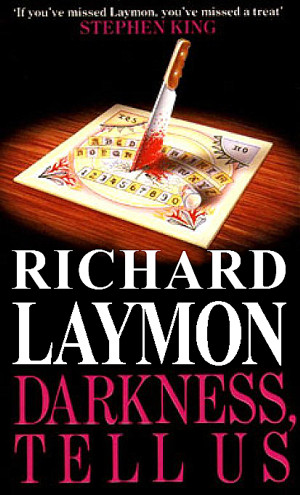 |
 |
Review by Lee Cushing |
|

by Richard Laymon 47North: Reissue edition - March 31, 2014 PB: 430 pages ISBN-10: 1477837051 ISBN-13: 978-1477837054 |
|||
My house is the host of unspeakable evil. Tucked away all over the place are about a dozen antique Ouija boards. Old shit. 1910s and 1920s shit. Cool shit. But in the eyes of many people, evil shit (try going into an antique store in the boondocks and telling them you're a collector of antique Ouijas and escaping without being doused by a water pistol full of holy water). My ex-partner and I collected them, but they were really his obsession. So, he gets them all once the split is complete and I'm living out of the house.
Lamenting this and needing a Ouija fix, I stumbled across the Laymon Ouija novel DARKNESS, TELL US. Laymon and the Ouija: how much better can it get? It amazes me how rarely authors use the Ouija as a backdrop for a quality horror tale (heck, even in The Exorcist, it's relegated to a supporting role). DARKNESS, TELL US offered hope that someone had finally written a fully-evolved tale featuring this oft-neglected tin can phone to the spirit world.
I ended up a little disappointed, though. Don't get me wrong, DARKNESS, TELL US is an entertaining read, but not among Laymon's best work. There's Ouija aplenty, there are subplots a plenty. But somehow, the whole is a bit less than the some of the parts.
Quick plot synopsis: College English professor Corie Dalton invites a small class over for an end of the semester celebration. They unearth a long-neglected Ouija board, and begin to experiment with despite Corie's warnings. The board is bad juju, as it gave Corie and her husband some chilling messages prior to his death. It's not your typical Parker Brothers Ouija.
The spirit communicating through the board calls him/her/it self "Butler", and offers to show the college kids where to find a treasure on treacherous Calamity Peak. The kids (or at least some of them) need the money, take off for the Peak, and intermittently listen to Butler's further directions via the board. Feeling responsible for them ever getting ahold of the board in the first place, Corine and the new love in her life give chase.
Subplots include the Corine's shadowy past of her board, the death of her police officer husband, her falling in love (and having some fairly hot sex) with her former brother-in-law, the blossoming romance between wallflowers Howard and Angela, and a mysterious bikini-clad, muscle-bound, machete-wielding male who menaces Corine and the kids while they're on the Peak.
DARKNESS, TELL US offers another fascinating Laymon rumination on alternate routes of sexual discovery. With the college kids as his canvas, Laymon subtly traces the differences between those whose discovery of sex is light and healthy, and those who did not so much discover sex as have it abusively inflicted on them.
However, this message gets lost in a clutter of subplots that start off energetically and then wither into obscurity or just stop cold with little or no explanation. The effect can be read in one of two ways, I guess. One is to appreciate these as red herrings that Laymon used to throw the reader off track. But I felt they gave the book a bit too much of an episodic feel. Too few of the subplots come to full development, and the punch line twist ending didn't satisfy me.
There's plenty to like about DARKNESS, TELL US, mind you. The blossoming Howard/ Angela romance is vaguely reminiscent of the Dwight/Slim dynamic in THE TRAVELING VAMPIRE SHOW (though ultimately disappoints in comparison). And all the Laymon essentials (high adventure, sex, graphic descriptions of each and every jiggle of breast and twitch of cock) are there. Maybe it's unfair to compare this book to Laymon at his best.
Three Bookwyrms.



This review copyright 2003 E.C.McMullen Jr.
| HTML: Live By The Code | |
| FEO AMANTE'S HORROR THRILLER Created by: E.C.MULLEN JR. |
| COME FOLLOW ME @ Amazon |
| ECMJr |
| Feo Blog |
| IMDb |
| Stage32 |
| YouTube |
| Zazzle Shop |

